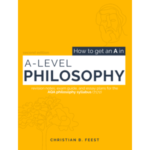In metaethics, cognitivism and non-cognitivism are two different views of what moral judgements – such as “stealing is wrong” – mean.
- Cognitivism says “stealing is wrong” is truth-apt. This means “stealing is wrong” is a statement that is capable of being true or false.
- Non-cognitivism says “stealing is wrong” is not truth-apt. This means “stealing is wrong” is not the kind of statement that is supposed to be true or false.
To understand the difference, compare the examples in the table below:
| Cognitive language |
Non-cognitive language |
| Descriptions or beliefs of how the world is | Not descriptions or beliefs, stuff like attitudes and emotions |
| Truth-apt: They are either true or false | Not truth-apt: Neither true or false |
Examples:
|
Examples:
|
So, for example, “Paris is the capital of France” is truth apt because it’s a true description. Likewise, “London is the capital of France” is truth apt because it’s a false description. Cognitivism says moral judgements like “stealing is wrong” are similar to the kinds of statements in the left column – they express propositions or beliefs – and these beliefs are either true or false.
In contrast, non-cognitivism says moral judgements are not truth apt – that they’re not descriptions or beliefs and so are neither true or false. Notice how the examples in the right column are not the kinds of things that are true or false. When people start booing at a football match, for example, it’s not like “boooo!” is true or false – it’s just an expression of emotional disapproval. Similarly, when someone tells you to “shut the door”, it’s not like “shut the door” can be true or false because it’s not a description of anything – it’s an instruction. So, non-cognitivism says that what “stealing is wrong” means is actually something more like the examples in the right column – it’s neither true or false.
Within non-cognitivism, there are different views about what kind of non-cognitive mental state moral judgements express:
- Emotivism says moral judgements are expressions of emotion.
- So, “Stealing is wrong” really means something like “Boooo! Stealing!”
- And “giving money to charity is good” means something like “Hooray for giving money to charity!”
- Prescriptivism says moral judgements are instructions (prescriptions) for behaviour.
- So, “Stealing is wrong” really means something like “Don’t steal!”
- And “giving money to charity is good” means something like “Give money to charity!”
(Notice how both prescriptivism and emotivism are non-cognitivist: They both broadly agree that “stealing is wrong” is not a truth-apt description, even though they disagree about what “stealing is wrong” actually means more specifically)
 The philosophy textbook written with the student in mind!
The philosophy textbook written with the student in mind!